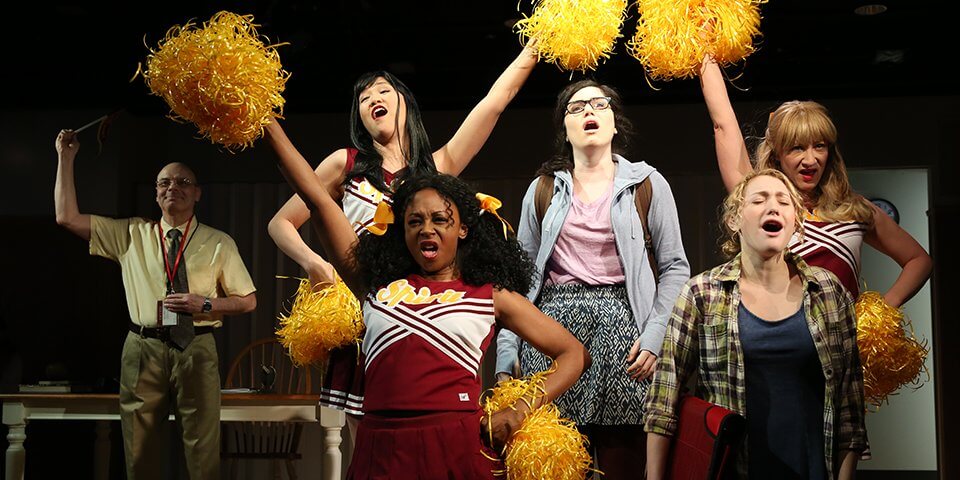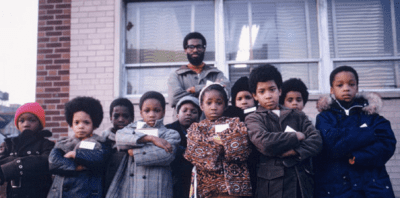Iowa: On Facebook, Sister-Wives and Perimenopause

Photo by Joan Marcus
via Playwright’s Horizons
A few months ago at the “Stalking The Essay,” conference at Columbia University, Marilynne Robinson spoke about the lost cultural civilization of the Midwest, and America’s habit of forgetting its own history. In Jenny Schwartz’s new musical, Iow@ (with music by Todd Almond and directed by Ken Rus Schmoll) she too, points her characters towards corn stalks, and caucuses. Unfortunately, in this uneven production, the Midwestern magic is lost on the audience.
Jenny Schwartz is best known for her play God’s Ear, written almost entirely in aphorisms—an incredible theatrical experience. In God’s Ear, we are never allowed to forget the subtext of inexpression—the characters are fighting to speak, but losing the battle, and instead must depend on borrowed language.
In Iow@, Schwartz uses a similar nonsensical text, but from the very beginning there is little emotional connection to either the words or the core conflict. The play opens with a monologue in which the character, Sandy (Karyn Quackenbush) tells her daughter, Becca (Jill Shacknew) that she’s moving them to Iowa so she can marry a man she met on Facebook. Sandy’s babbling stream of consciousness is instantly grating, and she prattles on:
Perimenopause. Sad face. One can still get pregnant. As long as one still gets one’s period. Are you writing this down? Becca? Need a pen? Lesson Two. Your body will betray you. Embrace it. Delete. Don’t let yourself go. Men are very visual. You wouldn’t understand. You’re a lesbian. Lucky duck. I have a wedgie. Don’t gloat. Moms can too wear hot pants. Says me. That’s who.
Almost immediately my eyes glazed over and I thought: Oh, this is a production where everyone yells at each other and no one makes eye contact. I walked away from the play fearing that Schwartz, despite her amazing work with God’s Ear, was a one-trick pony, and this time her tricky text work had let her down.
(It has to be said that there is also a character in an actual pony costume that sings about being a playboy—a moment I have yet to understand in the context of the rest of the play.)
And yet, not all is lost—in the second half there is a drive to get at something deeper and more worthwhile. Sandy and Becca, in a kind of anti-Chekhovian gesture, do actually make it to Iowa. There Sandy realizes that her Facebook fiancé is already married—to four other women, sister-wives style. The wives (the remarkable Annie McNamara, April Mathis, Cindy Cheung and Carolina Sanchez) spend a solid fifteen minutes singing in a looping rant about the complexities of their situations. This “sister wife melody” should have been the start and the end of the play. It was only during this—a section devoid of Sandy and Becca—that I began to understand that the production was speaking to the anxieties of being a woman. Specifically, the cultural neuroses that creates the vicious cycle of both listening to, and wishing we could quiet, the loud, critical voices in our heads. The sister-wives become a modern day Greek chorus rejoicing in triumphs, wailing for losses, and raging against themselves—ultimately producing a vocal committee that they now can’t escape from.
Iow@ ends with the nine-year old younger Becca (Kolette Tetlow) singing about the desire to become a hawk. It was no surprise that this was an elevated moment of joy. The rest of the cast backs her up, as we see from the perspective of a girl—and not a woman—that the future can be something you can rise above the trees to meet, just like a bird. That is, until you become an adult and are weighed down by of one of life’s, or Jenny Schwartz’s, opening monologues.
Iow@ is at Playwrights Horizons through May 10, for more info, visit here.
You might also like 



















